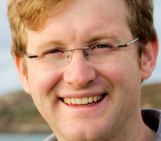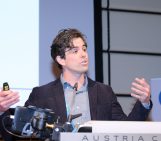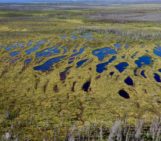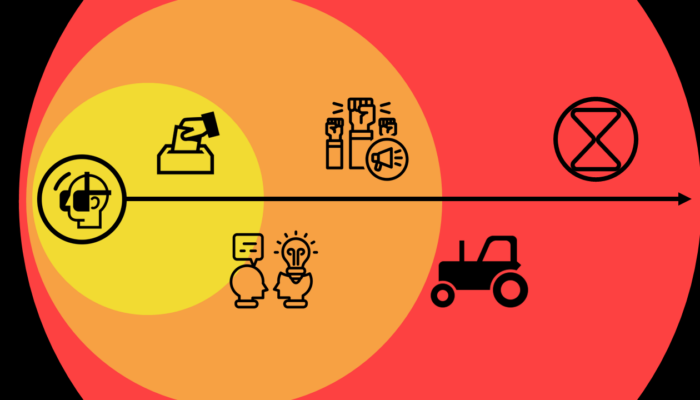
EGU has hosted a Great Debate with world-renowned climate scientists and activists about the growing human impact on our natural and social environment for many years. There are many aspects to the debate, from voting bad politicians out, to communication duties of scientists, the interconnection of a need for social equity and decarbonization, and more. In this blog post, I want to focus on the term “comfort zone” and how much we as scientists have to become aware of and leave it – according to #EGU24’s discussion panel.
The setting: human impacts on a geological time scale
Great debates are not new to 2024 and even within EGU former panels focused on human and scientist’s responsibilities with titles that read like this:
- 2022: Climate change is a code red for humanity: What does this mean for the earth science community?
- 2023: As climate change impacts accelerate, are we sleepwalking into the inferno…?
- 2024: The Great EGU Climate Debate: The Anthropocene – Epochalypse Now?
With this year’s great debate, let’s clarify the title:
- Anthropocene (/ˈanθrəpəˌsiːn/; noun: the period of time during which human activities have had an environmental impact on the Earth regarded as constituting a distinct geological age
- Epochalypse: The binary system in computing is limited to an amount of dates to be depicted. (from 000… to 111…). After that limited amount of dates, an all-0 date refers to a past date again. The epochalypse (also referred to as epoch or the year 2038 problem), refers to a 32-bit system that will be reached by 2038.
Said in simple terms: a jump back in time simultaneous to a new geological time scale predominantly impacted by human existence. One part of society expressing the needed change, fighting for it, while another part of society passionately rejects and suppresses that notion. The guiding question for the discussion was:
“All the climate science we are doing – are we doing a good job to get that into society?” – Rolf Hut
The panel discussion: To act or not to act? – that is the is that even the question?
The speaker of the EGU24 great debate on the Anthropocene included Prof. Michael E. Mann (University of Pennsylvania), Prof. Anusha Shah (Arcadis & Institution of Civil Engineers), Kelsey Beltz (The Good Lobby), and Carlos Shanka (Youth Environment Assembly at the UN Environment Programme). With a panel of such a wide array of societal and environmental expertise and experience, for the matter of this digest, I picked out the questions that were posed around the concept of staying in or leaving the comfort zone.

The #EGU24 GDB3 panel speakers and conveners: Michael Mann (top left), Anusha Shah (middle right), Rolf Hut, Hayley Fowler, Carlos Shanka, Kelsey Beltz, Noel Baker, Nick Everard (bottom left to right; photo credit: Maria Scheel).
One of the central topics tackled was that of leadership (especially in the exclusive form of politicians, as a need for leaders to “help us out of here”). After a lengthy discussion on informed voting in order to elect just politicians as leaders, the question was posed by Rolf: Where does leadership come from?
Anusha: I think this is one of the times where leadership does not come top down but needs to come from all levels. (…) We have a choice to wait for the right policy and wait for that to happen or we have different swim lanes, with people that can’t wait anymore.
Michael: Now, there has been traditionally a belief that scientists should avoid being involved with the larger debate over policy and solutions. We scientists should be wary of being too prescriptive of the methods. We all have to find our own comfort level. I got colleagues that got arrested in protest. That is great, they are comfortable doing so. Not everyone is. We all have to find our own comfort level with that.
Nick: Kelsey, to going to you Kelsey about Michael saying that scientists are being prescriptive.
Kelsey: My perspective is that we really, really need the voice of science and it’s not an integrity compromise. If you think of future generations – if we don’t make a stand – that’s when integrity is impacted. But science is not neutral anymore. There is almost an anti-progress movement. And I think even in the best of times your data, your research does NOT speak for itself.
Carlos: We really need young people at the table. We do not need people who will not be here in 2070 to take the same authority like young people. (…) But for you scientists: information is masked because we got too much info and it is too loud. So – we need the actual experts.
Audience: We as scientists increasingly understand the role of outreach and science communication. And while that is important, Michael said finding the comfortable spot. Maybe we should get out of the comfort zone?
Kelsey: I don’t want you to come out of your comfort zone, but the role of science is essential. They don’t know you know. I walked around today and I have no clue what you know. Your role is crucial, also in your comfort zone.
Audience: I will vote in the next elections. But I learned from farmers that there are better ways to be heard – so should I buy a tractor? Do we as scientist community play a role in that backlash? How far should we go? Should we block roads?
Michael: Find your voice! Each of us has a unique set of talents and backgrounds. Don’t be someone else in communicating about the climate. Find your voice.
Anusha: But equally connect and share with people who might communicate better. The movie industry is very influential. Let’s make movies that really explain the right way. The artists, the fashionist, every platform!
Kelsey: My office is in Brussels – where the tractors are. This is a lobbyism exercise. It’s very effective. Yes, science helps, policy helps, but this is a perfect example, don’t buy a tractor, they are loud. But this is a perfect example.
Audience: But maybe we need to be loud? (room applauds loudly)
The discussion was closed with the panelists’ one-(or-more)-sentence-statements:
Michael: Don’t be afraid to call out the bad actors. We need to recognise urgency and our agency. It is not too late.
Anusha: I think let’s make it fast to be professional what we are while being activist at heart.
Carlos: Help to stop greenwashing with science and communication. Elevate your voices.
Kelsey: Roll up your sleeves and engage politically. If not, bad actors will. Dive in and please do because we need you.
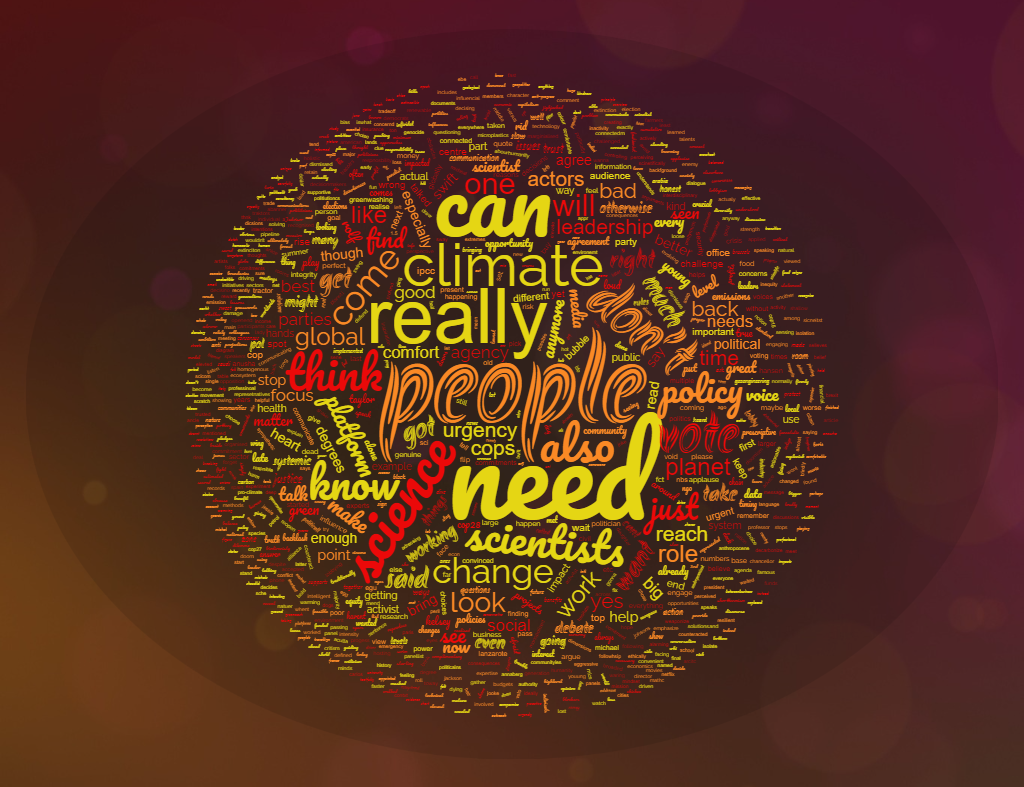
With a one-hour debate of thought leaders in climate action and knowledge, it is hard to synthesise every spoken word. Instead I put the complete transcription into a word cloud. Surprisingly, in the middle it almost literally reads “people – also – need – scientists”. Coincidence? (Credit: wordclouds.com).
The synthesis: what is it that you as a scientist should do?
There is no doubt, that our usual ways won’t be sufficient. And the change coming from one person alone might be insignificant. Yet, “You can be what you can see” and indeed living the decisions and actions you want to see, rather than waiting for leaders to enable it, means taking ownership of our own life. To me it stood out especially how Anusha highlighted the belief that everyone carries an important set of skills and experiences to bring forth. As I would like to say:
“We need to be our own Taylor Swift of the environment, not blame the actual singer for what she does and doesn’t do.” – Maria Scheel
Leaving the comfort zone is not accessible to all, due to an uneven distribution of privilege and resources even among the science community (read more about privilege in academia and check the wheel of privilege and what it means to you). Yet and admittedly, most of us could fight 1% more – but how? That is why I would love to collect your thoughts on it (scroll on a little more).
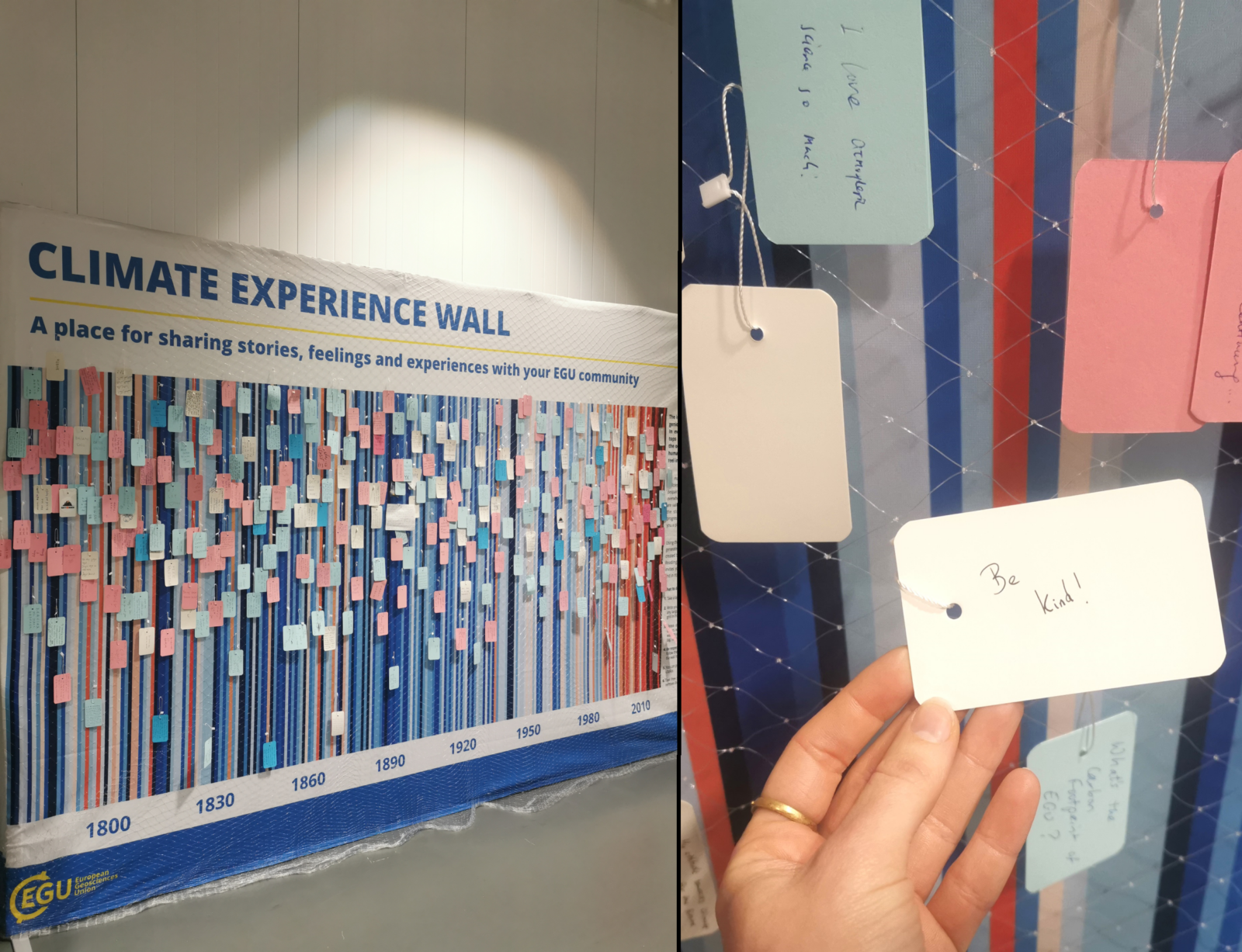
Messages from the #EGU24 Climate Wall (poster hall X2, on the entrance to X1, photo credit: Maria Scheel)
The survey: Could we see our comfort zone… and step out of it?
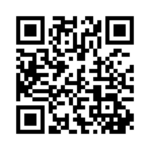
The climate wall during the #EGU24 is already a great place to share your thoughts, and while my personal favourite is to “Be Kind!” (see photo above), I would like to know it more in depth.
If you have three minutes, I would love to ask you on your own attitude towards your personal level of acting (anonymously) in order to collect a range of voices from within the EGU in this survey: https://www.menti.com/alueqp3yqqbi
Edited by Hazel Gibson

